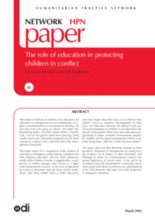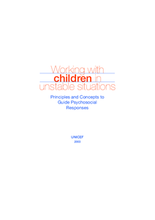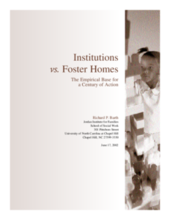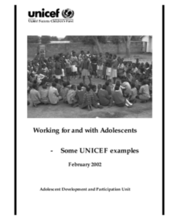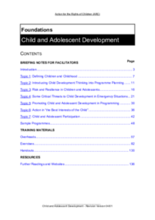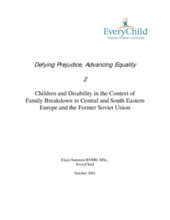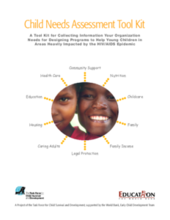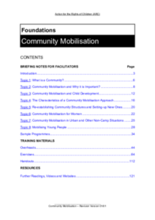Displaying 471 - 480 of 490
Examines the link between education and the protection needs of children, with a particular focus on the role of education in emergency response.
Discusses the psychosocial impacts of unstable situations on children and their families, with an emphasis on child development. Includes UNICEF’s position on policy and programming principles as well as strategies to address the psychosocial needs of children, families, and communities.
A review of institutional care and family-centered care with a discussion of both positive and negative aspects of group care. This review paper is primarily focused on showing the inefficacy of group care and recommending other forms of care such as kinship care and even foster care as options that are more cost effective and better for children’s development.
Compiled case descriptions from a diverse set of programs that work with and for adolescents. Analysis emphasizes common challenges and lessons learned for strategic planning.
This article, a chapter in the book Family Foster Care in the Next Century, describes how child well-being has been conceptualized and measured in research on family foster care, and discusses the essential dimensions that should be included in a useful measure of child well-being.
Resource pack for a course in child and adolescent development. Emphasis on identifying threats to childhood development and strategies to promote development in adverse conditions. Includes facilitators notes, participatory exercises, overheads, and handouts.
A study on children with disabilities in the context of family breakdown. Includes overviews and statistics from 10 countries, a call for strengthened family support services, and draft guidelines on how child agencies can better mainstream these issues into their work.
Residential Child Care Staff Selection: Choose With Care draws upon international research and the experience of practitioners to help you improve your ability to recruit the best staff in residential care settings for children.
A comprehensive tool kit providing a methodology, questionnaire and software for assessing the needs of young children affected by the HIV/AIDS epidemic. Used to help design of service programs, secure funding, and monitor and evaluate programs specifically targeting the needs of young children and their families.
Discusses the importance, benefits and challenges to community mobilisation for refugees and other displaced persons, with a particular emphasis on children. Includes facilitators notes, participatory exercises, overheads, and handouts.

